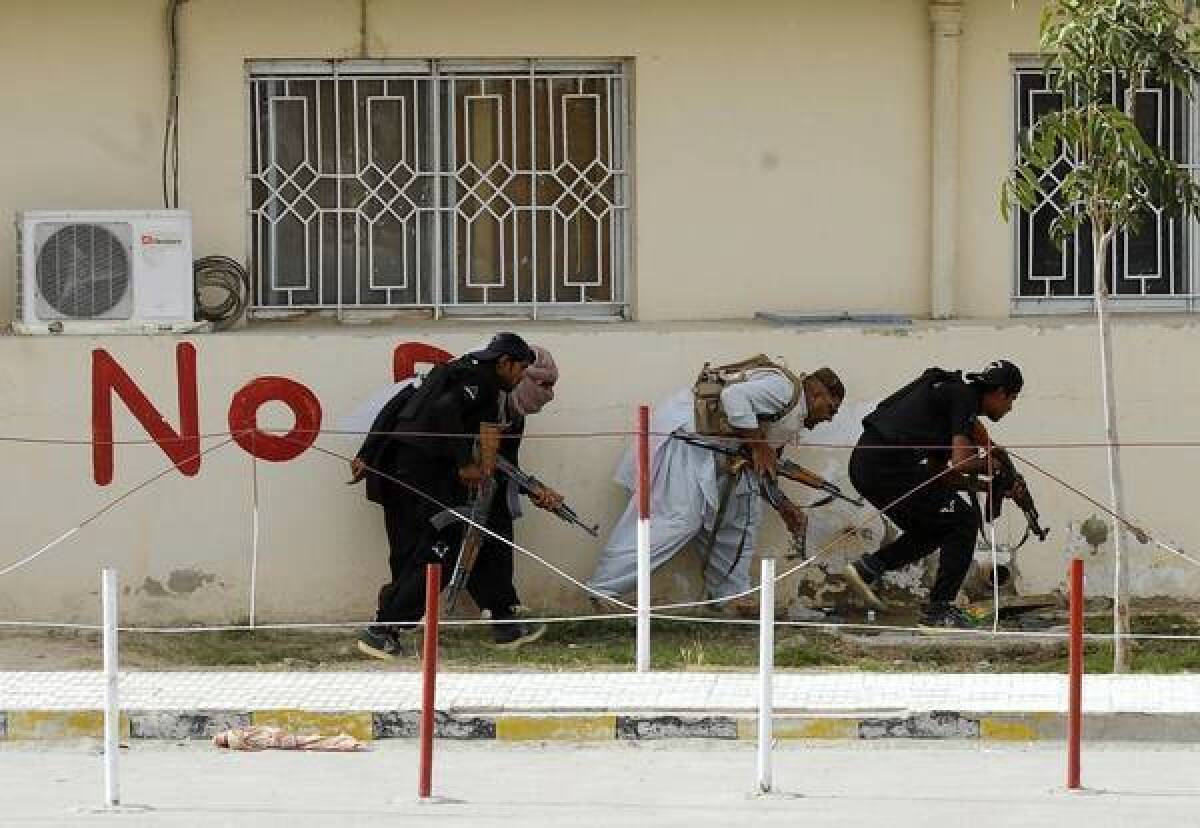In Pakistan, attackers bomb women’s university bus, hospital

- Share via
ISLAMABAD, Pakistan — Militants laid siege to a hospital and bombed a women’s university bus in the southwestern Pakistani city of Quetta in a wave of violence that killed at least 19 people and underscored the challenge facing new Prime Minister Nawaz Sharif as he begins to tackle militancy in the troubled South Asian nation.
Gunmen had seized parts of the Bolan Medical Complex in Quetta, capital of Baluchistan province, and for several hours exchanged gunfire with police and special forces commandos surrounding the building, local police said.
At least 35 doctors, nurses and civilians were held hostage by the militants during the siege, but by mid-evening, security forces had retaken the hospital and freed the hostages, said Interior Minister Chaudhry Nisar Ali Khan.
PHOTOS: Gunmen take over part of a Pakistan hospital
Four of the militants were killed during the gun battle, and a fifth was captured by police, Khan said.
The violence began Saturday afternoon at Sardar Bahadur Khan Women’s University in Quetta. Female students had just boarded a bus on campus and were leaving when a homemade bomb exploded in the vehicle. Khan said 14 female students were killed and 19 injured, many critically.
The wounded students were taken to Bolan, where a second bomb was detonated in an emergency department corridor, police and federal officials said. Authorities initially thought the attacks on the bus and hospital were related, but by late Saturday said they were not sure.
Militants who were able to get inside the building then opened fire, killing Quetta Deputy Commissioner Mansoor Kakar, who had rushed to the hospital after hearing about the bus bombing.
The attackers dispersed into several sections of the building, taking hostage medical staff and relatives of victims of the bus bombing. Some of the gunmen fired at police from the rooftop.
During the exchange of gunfire, four Pakistani paramilitary soldiers were killed, Khan said. There were also reports that three nurses and two doctors were killed in the gunfire, but those could not be confirmed.
Sharif and President Asif Ali Zardari condemned the attacks as “cowardly and inhuman.” In a prepared statement, Sharif said, “No effort will be spared to save Pakistan from such acts of terror.” No one had claimed responsibility for the violence as of Saturday evening.
Sharif was elected prime minister by the parliament June 5 after his party, the Pakistan Muslim League-N, won a convincing victory in legislative elections in mid-May. He and his party are seen by many in the country as being soft on militants, and attacks like those Saturday probably will put pressure on the 63-year-old leader to clamp down on extremists responsible for bombings and other terrorist attacks that have killed thousands of civilians in recent years.
Baluchistan, the country’s poorest and most sparsely populated province, has for years been plagued by the presence of an array of militant groups, including pockets of Taliban commanders and fighters, sectarian organizations such as Lashkar-e-Jhangvi that prey on the province’s Shiite Hazara minority, and Baluch separatists fighting the state for greater autonomy.
In a separate outbreak of violence in Baluchistan on Saturday, militants used rockets and hand grenades to attack a 19th century residence associated with Pakistan’s founder, Muhammad Ali Jinnah, in the town of Ziarat, about 45 miles northeast of Quetta. The attack badly damaged the house, federal officials said.
Special correspondent Syed Ali Shah in Quetta contributed to this report.
More to Read
Sign up for Essential California
The most important California stories and recommendations in your inbox every morning.
You may occasionally receive promotional content from the Los Angeles Times.












